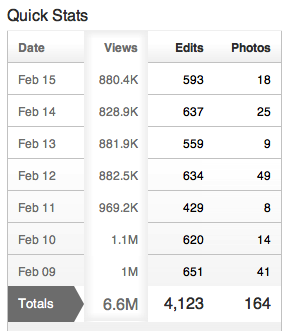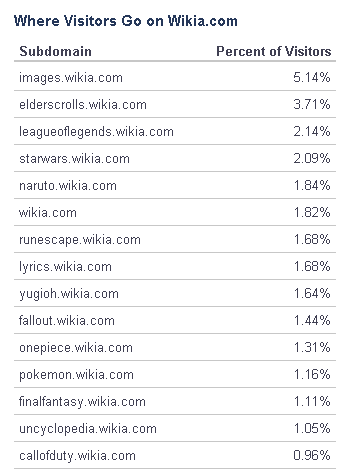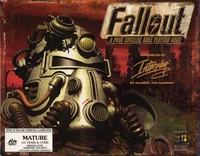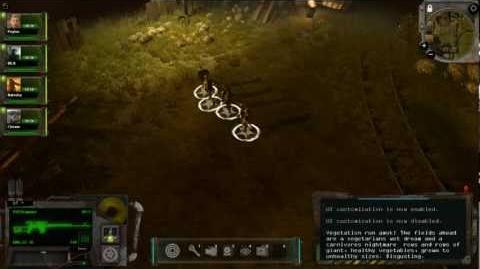Welcome to the Nukapedia News Digest, brought to you by Pawn Stars - New Vegas, now showing on NCBS - The New California Broadcasting System.
In your edition this week.
From the administrative Enclave[]
Some discussions for you all to join this week
- I'm proposing changing the way a few things appear on the front screen, to give more emphasis to game news, without losing the regular features we have each week. I've also suggested maybe turning the colour from Green to Blue whilst we're at it. Make sure you stop by.
- And Scribe Aurora has suggested some standardisations that you can help contribute to.
Attention Nukapedia... Travellers?[]
Planning a trip? You could do worse than Singapore Airlines (from Digital Spy)...
- Singapore Airlines has come up with a unique way to spend long flights by offering a selection of games including the classic post-apocalyptic RPG Fallout.
- The airline is debuting what it calls the 'Red Eye Collection Games' - featuring a mix of 15 classic games from different genres - on its in-flight entertainment system.
- Fallout is the highlight of the collection, while other classics like Syberia, MDK 2, Earthworm Jim 2 and Worms Armageddon round out the selection.
- Worms Armageddon is actually exclusive to Singapore Airlines as far as in-flight entertainment goes, along with spinoffs from the series such as Worms 3D, Worms Blast and Worms Pinball.
- The games are playable on a screen built into the back of each seat, along with a special controller attached to the seat.
- The Red Eye Collection Games are currently available on select Singapore Airlines Airbus A380-800 aircraft, with the service rolling out to all A380s, as well as the A330-300, A340-500 and Boeing 777-300ER fleets.
No word if it will be available on Vertibird flights.
I can't help but notice that the other games are very Interplay heavy... Which leads me to wonder if the game will be available after the end of this year, when Interplay's license to sell the classic Fallout games expires.
Chatting at the Cafe of Broken Dreams[]
Todd Howard talks to RockPaperShotgun[]
This is from RockPaperShotgun.
- “We’ve worked on the PC for a long time, so it’s always new and marching forward,” he explained in a brief chat with RPS. “So when there are new boxes, it won’t be that much of a sea change for us, to be honest.”
- Naturally, then, Howard’s primary concern is the same as it’s always been: making worlds that feel more tangibly alive. So I asked him how he plans to go about doing that next – whether that means improved AI, more expansive environments, better combat, or a host of smaller details – and his answer surprised me a bit: graphics. Then again, I guess it makes sense. Howard always has been about the big picture.
- “Everybody always wants more power,” he said. “As a developer, you always want more. How good will it look with more memory? How many people can we put on screen if we have more processing power? But even with all of those things, I think people discount graphics. They’ll say, ‘Well, the gameplay’s what really matters,’ and it does. But I do feel that graphics and your ability to present something that feels new, real, and believable puts people in that environment where they can really enjoy what they’re playing.”
- But just exactly what sort of environment will that be? Well, while Howard openly (and completely non-shockingly) confirmed that Bethesda proper has something new in the works on top of Skyrim DLC, he refused to narrow its setting down to Bethesda’s sci-fi/fantasy bread and butter.
- “When I look at gaming, I like to go live in worlds and do things I can’t experience,” he said. “That I want to touch and explore. There are certain types of fantasy that appeal to me, but there are also period pieces, and if something was good in the modern day, I’d want to do that as well. Writing anything off at any point in time is silly.”
- So that’s… broad. But honestly, I’m all for seeing Bethesda break out of its typical mold. And, I mean, if The Elder Scrolls has its wayward heart set on MMO glory and Obsidian’s chomping at the bit to blow up even more of the world, it does make sense. Just, you know, maybe stay away from modern conflicts and gangster dramas if you’re going current day. We already have plenty of those, and other things do occasionally happen. Sometimes. I have heard.
Feargus Uquhart[]
The Guy who put the Black Isle in... err, Black Isle, has also been talking to Rock Paper Shotgun. We've highlighted something in his first response we think you're really going to like.
RPS: The recent industry “transition” has taken a ridiculous toll. It feels like it’s been layoffs every other week – which is weird, since it’s basically been every week. It’s been hard to watch, to say the least. Obviously, you guys temporarily lost a publisher, but are you chaffing elsewhere? After all, your biggest project [South Park] is slated to come out sometime this year. What happens after that? Are you worried about securing more work?
Feargus Urquhart: If you asked me that question eight weeks ago, I would have said yes. Luckily we signed another contract in December. I can’t go into any details about it, but it’s a game that will employ at least the same number of people that are working on South Park right now. And of course, our hope is that there will be more South Park work. It would be awesome to keep on working with Matt and Trey and the group.
For us, we’re doing pretty good right now. I can’t rest on my laurels, as they say. And this is where I say “I” and not “we” because this is the “me” part of Obsidian. Now I have a year, probably about a year, to get a publisher interested in a game so that then we can go through the six-or-nine-month period of getting that thing signed up. It’s nice. I have about 18 months right now to get that next big thing signed up. It’s giving us a good amount of time to get all our ideas together. Having Chris Avellone as one of my partners is awesome, because he’s a fountain of ideas. Along with Josh [Sawyer], and now having Tim Caine at the company. This is going to give us the time to sit down and say, “What is this game we want to make?”
So, I think the big thing for us right now is, what is going on with RPGs right now? Obviously Skyrim was successful, and Fallout was successful. Mass Effect is still successful, even with all the hoopla. Dragon Age is a little rocky.
...
RPS: Your reference points on that front sound pretty console-driven. Speaking of, where is PC relative to consoles at this point, in Obsidian’s eyes? I mean, PC has obviously come into its own in recent years. A lot of that on its own strengths as a platform, but some thanks to consoles being on a downslope because this generation is so old. Do you think PC will continue to thrive because it’s a more unique platform now, or does it take a bit of a backseat soon for larger developers like yourself?
Feargus Urquhart: PC development has gotten easier. Console development has gotten easier, but not by a large margin. You still need these console development kits and you still need to go through all these processes. Any developer can go release a mobile, tablet, PC game, but they can’t do a console game. Yes, there’s XBLA and PSN and stuff like that, but those are hard markets. I think those are really hard markets. Steam just doesn’t seem to be as hard of a market for independent games.
There are publishers that… I have no idea what the numbers are, but I’ll bet you that Bethesda is perfectly happy with the PC sales of Skyrim. EA, I know, though they won’t announce it to the world, they sell a lot of PC product. Additionally, they’ve always traditionally sold a lot of PC product. This was a number of years ago. Maybe it was four or five years ago. I’m pretty sure it was still like 40 percent of their sales were coming from PC product. They were just quietly going along, not announcing it.
But I think PC absolutely has a place, because it’s easier than console. Again, more people making those games have more control over their destiny. In a lot of ways there are better tools. It’s easier now than ever for a small team to get a pretty cool game out. Ten years ago it was a lot harder.
RPS: For Obsidian, what are the core tenets of role-playing games? You could say something like The Walking Dead is a role-playing game, if you choose to zero in on choice and story as key elements of role-playing games. For you personally, is it that fusion, that sort of midpoint between choice and story and combat and character growth?
Feargus Urquhart: It is combat, toys, and story. Sorry, it’s combat, characters, toys, and story. Why I’m separating characters and story is because when you’re playing a great role-playing game, you have relationships with NPCs. They aren’t really the story. To me, and Obsidian, a story is something that I can… I know where to go in the story, but I’m choosing I want to have the story play out. Which you see in a lot of our games.
Sometimes it’s what gets us in trouble. We want and feel that what an RPG is about is the ramifications of my actions in the world. Not just system-wise – I rip this guy off and so this stuff happens. I don’t mean that. It’s, “I chose to do this.” Usually consciously, occasionally unconsciously. Then this is the ramification of that. Bundled, of course, with fun combat and character development. I’m a min-maxer so there’s my love of figuring out the exact character build. But that’s it.
I guess if you need to boil it all down… I’m not to say “more than other game developers,” but I don’t think that’s the case. Maybe we talk about it a little bit more. But it’s the choice aspect of RPGs. RPGs are so much about choice and the ramifications of those choices. This is something that Chris Avellone hit upon that really is a tenet of what we do now. In Alpha Protocol, he really pushed this idea forward that there is no [good or evil]. Morally there may be a good or a bad choice, but there is no bad choice for the player. Even if it’s “evil,” you’re rewarded.
And not just with cash. A lot of RPGs in the past, the way they handle good and evil, if you did good you got a pat on the back and everyone was nice to you, and if you were bad you got money. In Alpha Protocol it was about making the choices a bit more gray. The problem with gray choices, of course, is that it’s hard for the player to… They don’t just see it as being evil or being good. You then have to explain it more. The gray choices then come with, “No, this is what’s gonna happen.” There’s a near-term, medium-term, and long-term reaction, if we can do it that way, to all of these choices that you make. That web is what makes the game feel like it’s my game.
...
RPS: Conversely, going back to your redefinition of RPGs, I think a lot of people are defining them as “big.” They’re almost pushing that as a selling point. That’s what The Witcher is doing now, and Dragon Age III. Obviously Skyrim. Skyrim is what I think made both of those want to do that. For Obsidian, will that be one of your future tenets? Going huge and making this really big world that people walk around in and live in?
Feargus Urquhart: I would say that’s maybe one of the types of RPGs that we would make. I think there’s still a place for the KOTOR, Mass Effect style – I really do – in which there’s this universe for players to play around in and they’re going from planet to planet to planet. But it’s a different experience from this big open world. It’s a little bit more story-driven. It’s a little bit more linear and things like that. But it’s not like that’s a bad thing. All RPGs don’t need to become more focused on scope as their feature. It doesn’t just need to be that way.
Games to pass your time until Fallout 4 comes[]
New Vegas 2[]
I didn't think this was going to be as big as it was, so I was holding it back for today... Looking at the response to TrailerParkApe's blog, I was wrong in that... RockPaperShotgun have been drip-feeding from an interview with Feargus Uqhart about plans for a possible "Sequel" to New Vegas in Los Angeles... I just quote the Ape's blog here.
- And we need an interesting confined area. So I mean, it could be LA. Fallout LA. That could be interesting. It’d probably be The Boneyard, which is from Fallout 1. It could be very different. It could be almost a Walking Dead meets Fallout-like thing because of all the radiation.”
- After Feargus made that statement, Rock, Paper Shotgun reached out to Todd Howard. Todd Howard said, along the lines, that Fallout: New Vegas was great and that hopefully sometime down the road they can expand upon it.
News from the Wastes[]
We had a link to this the other week, but InXile have moved their playthrough to YouTube and HD-afyied it, so now you can see InXile's work and hear Mark Morgan's classic stylings
Maybe its just me but the whole experience reminds me of Gecko (town)...
Bethesda's Marketing companies talk to Cinemablend[]
Perhaps something a bit odd for the Nukapedia News Digest, but those of you interested in careers in Cinematics or Marketing might be interested in this piece with Cinemablend, where they talk about the construction of the trailer for The Elder Scrolls: Online... Its a side of the gaming industry we don't get to hear about too much.
- For the Elder Scrolls Online trailer, what was Bethesda/ZeniMax's contribution to the project? How much direction do they give you?
- Ed Davis, Account Director at AKQA: The teams at Bethesda Softworks and ZeniMax Online Studios play an important role in the development of a cinematic like this. In the early stages we work closely with them to make sure the cinematic story is in sync with both the marketing messages and the game themes, and the developers provide a lot of material as inspiration. As we get into production, the development team provides references and ensures accuracy for things like weapons, armor, and environments. And of course they review passes of the trailer as it moves through each step of the process to provide feedback.
- What did you use for inspiration when you were creating this trailer? Did you watch gameplay footage of Elders Scrolls Online?
Davis: When we first started working with Bethesda Softworks on the brand and marketing for The Elder Scrolls Online, the leads from the development team at ZeniMax Online Studios spent a lot of time walking us through the game in great detail. We latched onto the idea of these three alliances locked in a massive war to control Tamriel, and it quickly became the center of our efforts. From there, we knew it was important to tell that story and introduce the alliances in a cinematic manner and get fans excited about the upcoming closed beta.
...
- In the trailer, we see three factions battling for control of a citadel. Did you envision this as being a specific location in the game world? Along those same lines
- are the three lead characters in the trailer supposed to be specific personalities from the game?
Davis: We can't go into specifics about the citadel, but the setting was definitely a topic of much discussion. As far as the three lead characters in the trailer, they were designed for us throughout the marketing campaign as examples of potential player characters rather than specific personalities from inside the game. You'll be seeing a lot of them across The Elder Scrolls Online advertising.
Generation... Next[]
PS4 Controllers[]
Some news about possible new controllers for the PS4. Firstly from Ars Technica comes these images of a classic dualshock-style controller on what appears to be a devkit... Notice the Move-style top, and trackpad-looking thing in the middle (Where the start button should be).
But as classic as the Snes-Dogbone style is, it may just not cut it in the next generation... Gamechup have spotted this patent claim for a "Playstation Eyepad"
From the patent:
- An input device for an entertainment device comprises a first main surface, one or more side edges, one or more motion sensors operable to generate motion data, and a wireless communicator for transmitting the motion data to the entertainment device, wherein an elongate illuminated region extends along some or all of one or more of the side edges; in addition the input device may comprise a first stereoscopic camera and a second stereoscopic camera having respective viewpoints located at opposing corners of a first area of the main surface, the field of view of each stereoscopic camera encompassing a first volume of space immediately above the first area, wherein the first and second stereoscopic cameras are operable to generate respective stereoscopic images, from which a first depth map and complementary second depth map may be generated for opposite sides of an object placed within the first volume of space.
- Sony of course have some... Announcement planned for Feburary 20. I'll publish a special breaking news edition when it hits.
Xbox creator "Fed Up" "Not going to take it anymore"[]
I think this blog from Xbox "Creator" "Natbro" was relayed everywhere, but just in case you missed it.
- I was a founder of the original xBox project at Microsoft and gave it its name. Almost 14 years after the painful, pointless, and idiotic internal cage-match to get it started and funded, the hard selling of a compelling and lucrative living-room product to Bill (and then Steve as he began to take over), a product that consumers would want and love and demand, I am actually still thrilled to see how far it has come, how many installed units it has, how it is crushing its original console competitors, how the brand has grown and endured, and especially how great the games have become.
- But the past 5 years, and the last year in particular, have been simply painful to watch. Coasting on past momentum. Failing to innovate and failing to capitalize on innovations like Kinect. Touting strategic and market success when you’re just experiencing your competitor’s stumbling failure (yes, Sony, Nintendo – you are, I’m afraid, stumbling failures). A complete lack of tactical versus strategic understanding of the long game of the living room. It culminated for me in recent coverage1 of interviews with Yusef Mehdi and Nancy Tellem and reports of the goals of a new LA xBox studio to create interactive content.
- My gripe, my head-smack, is not that the broader content/entertainment business isn’t where you want to go with a living-room-connected device. It absolutely is. Indeed, this was the point of xBox, that was why it was the Trojan horse for the living room, where we could land and be welcomed by millions of console customers with more hardware and better software and network connectivity than the non-console devices (webtv, cable set-tob-boxes) we had been pursuing. No, more and better content was always the point and the plan. My gripe is that, as usual, Microsoft has jumped its own shark and is out stomping through the weeds planning and talking about far-flung future strategies in interactive television and original programming partnerships with big dying media companies when their core product, their home town is on fire, their soldiers, their developers, are tired and deserting, and their supply-lines are broken.
It goes on, but amongst his gripes is the $10,000 Microsoft charge developers to gain access to the Xbox store (in contrast with Apple's $99), Microsoft's veto power over products and bad OS interface design, and goes on to suggest...
- Apple is already a games competitor broadly, even if Apple-TV isn’t yet a game platform or a console. Mobile generally and iPad specifically have grown the total hours of game play and grown the overall game market. Only in the last 18-24mo has that overall growth turned from a segment-expanding rising tide to a tsunami swamping the console game vendor profit boats hitched to the docks. It is accelerating. Apple, if it chooses to do so, will simply kill Playstation, Wii-U and xBox by introducing an open 30%-cut app/game ecosystem for Apple-TV. I already make a lot of money on iOS – I will be the first to write apps for Apple-TV when I can, and I know I’ll make money. I would for xBox if I could and I knew I would make money. Maybe a “console-capable” Apple-TV isn’t $99, maybe it’s $199, and add another $79 for a controller. The current numbers already say a lot, even with Apple-TV not already an open console: 5.3M sold units in 2012, 90% year-over-year growth — vs. xBox 360 — about 9M units in 2012, 60% YoY decline.
Old gamers like me might remember Apple's previous attempt to get into the gaming industry (with Power-Ranger toy maker Bandai) - The Pippin.
EA talks Next Gen[]
Gamasutra sat in on a talk by EA's CFO Blake Jorgensen about the next generation in gaming (at the Goldman Sachs Technology and Internet Conference). Here's a few bits of interest.
Backwards Capability[]
- "An important thing to remember is that next-gen consoles will most likely not be backwards compatible… And if you [play] multiplayer on a game, you'll most likely not be able to play with someone on a different generation. And so if you're a FIFA player and, and the soccer season's starting in August, and all your friends are playing FIFA, you're going to want to be on the same box that they're on. So if they all go out and buy a gen-four box if it comes out at Christmas, then you'll most likely do it. If they all hold on and continue to play on third-generation, you'll probably not see that box purchase until after the soccer season's over.
The consoles themselves[]
- "No one's really seen yet… I mean, we have internally, but no one externally has really seen what the look and feel will be like on the new consoles. So I'll reserve judgement other than to say that I think people are going to be pretty excited.
- "I do think once again without describing the new consoles, you've got to assume they're going to be highly integrated into the living room and the house, and there will be a lot of capability for interaction. I think the console makers have seen what the typical gameplay is today. It's very different than five years ago, or ten years ago. It was typically single gameplay, not dual gameplay or multi game players. So there's going to be some connectivity potential around that to make the game much more exciting.
- "I think as well you're going to see a lot more integration between tablets, phones, and the consoles over time. You're going to see people playing on glass at the same time they're playing on the console. And there's going to be some exciting innovations around that. And I think it's going to be an extension of moving from what's in the living room to what's outside the house. Even though it might not be playing on the console, it's connected to the console in some way.
Used Games[]
- "It's one of these classic double-edged swords. In one way the used game business has been critical for the health of the retail channel, and having a healthy retail channel is an important thing for us. The business will probably never be 100 percent digital. Bandwidths are a constraint, and will continue to be a constraint for many years to come, which hold back the ability to do full digital downloads of some games.
- "So at the end of the day, it's storage capacity. Unless you've got a giant storage server in your house, keeping hundreds of games can tax your storage capacity. And so having a healthy retail channel out there like GameStop or Best Buy or others is important, and to the extent that used games is important to them, I think that's a positive.
- "Would we like to sell everything at full price and not have a used game market? Sure. But I think the used game market's a little like any other kind of market where it creates liquidity. The fact is, that liquidity benefits us in some fashion. So if someone goes in and trades in a game, there's a good chance they're going to buy another one of our games. And so if there's a liquid market, I think that that's not a bad thing at all.
- "I can't really comment on where the next generation boxes are going to be relative to used games. I will say that the trend in the business is to have that always-on connectivity and connect with a customer, and to the extent that the software identifies a certain customer is going to create some issues going down the road in the used game market. But I do believe that the consumer likes it, and it's been good for the retail channel."
MCA plays Arcanum[]
Chris Avellone plays Arcanum: Of Steamworks and Magick Obscura, a game designed by fellow Fallout veterans Jason D. Anderson, Leonard Boyarsky, Timothy Cain.
Arcanum: is available from gog.com
Wrap[]
The week in stats[]
We don't just have pageviews and edits this week, we also have a breakdown of just how popular each subdomain at Wikia is...


We're officially 50% more popular than Call of Duty. You better watch out Yu-Gi-Oh, you're next!
The Moose is back[]
For those who missed it, The Moose is back! With more updates, more content, and more more coming your way hopefully every week. Stop by, have a drink, maybe even get enslaved whilst you're there...
Apprentice[]
Just a reminder Apprentice contestants, you must have your entries in by 23:59 wiki time on 23 Feb. Current Wiki time is 10:50.
Relic of the war that wasn't[]
When we're talking Relics, one important consideration we have to take into account is how to store radioactive relics... Well the answer isn't as hard as you might think it is.
This isn't just an issue that effects us, XKCD has put some thought into how to store nuclear fuel, and has found some interesting things about Nuclear fuel storage ponds
- Spent fuel from nuclear reactors is highly radioactive. Water is good for both radiation shielding and cooling, so fuel is stored at the bottom of pools for a couple decades until it’s inert enough to be moved into dry casks. We haven’t really agreed on where to put those dry casks yet. One of these days we should probably figure that out.
- The heat wouldn't be a big problem. The water temperature in a fuel pool can in theory go as high as 50°C, but in practice they're generally between 25°C and 35°C—warmer than most pools but cooler than a hot tub.
- For the kinds of radiation coming off spent nuclear fuel, every 7 centimeters of water cuts the amount of radiation in half.
- Swimming to the bottom, touching your elbows to a fresh fuel canister, and immediately swimming back up would probably be enough to kill you.
Yet outside the outer boundary, you could swim around as long as you wanted—the dose from the core would be less than the normal background dose you get walking around. In fact, as long as you were underwater, you would be shielded from most of that normal background dose. You may actually receive a lower dose of radiation treading water in a spent fuel pool than walking around on the street.
- That’s if everything goes as planned. If there’s corrosion in the spent fuel rod casings, there may be some fission products in the water. They do a pretty good job of keeping the water clean, and it wouldn’t hurt you to swim in it, but it’s radioactive enough that it wouldn’t be legal to sell it as bottled water. (Which is too bad—it’d make a hell of an energy drink).
(Our emphasis)
XKCD do include a bit more detail than I do here, and of course do it in their own style... Anyone fancy a swim?
Your Next Nukapedia News Digest[]
Although the News will be back as usual on the 23rd, we'll have a special news blog with the Sony Playstation announcement on the 20th. See you all then. Agent c (talk) 20:39, February 16, 2013 (UTC)








